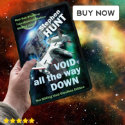A | B | C | D | E | F | G | H | I | J | K | L | M | N | O | P | Q | R | S | T | U | V | W | X | Y | Z
Asimov, Isaac (Isaac Asimov)
Isaac Asimov, the renowned science fiction author, was a man of many talents. Born around January 2, 1920, he left an indelible mark on the literary world with his imaginative and thought-provoking stories. But don't be fooled by his scientific prowess and academic background as a biochemistry professor at Boston University—Asimov had a whimsical side that charmed readers around the globe.
In the realm of science fiction, Asimov stood tall among giants. Alongside Robert A. Heinlein and Arthur C. Clarke, he formed the revered "Big Three" science fiction writers. His reputation as a prolific wordsmith was well-deserved, as he wrote or edited an astonishing 500 books during his lifetime. If that's not impressive enough, he also penned an estimated 90,000 letters and postcards. Who needs teleportation when you can communicate through the mail?
While Asimov's hard science fiction stories earned him widespread acclaim, his versatility shone through in other genres as well. Mysteries and fantasy danced within the realm of his imagination, resulting in captivating tales that delighted readers. He even dabbled in non-fiction, sharing his extensive knowledge on a range of subjects. Asimov's interests spanned far and wide, covering everything from chemistry and astronomy to mathematics, history, biblical exegesis, and even literary criticism. He was like a walking encyclopedia with a playful wink.
Of all his works, the Foundation series catapulted Asimov to iconic status. The first three books of the series garnered the prestigious Hugo Award for "Best All-Time Series" in 1966. However, that was just the beginning. Asimov's storytelling prowess continued to soar through his Galactic Empire series and Robot series. Remarkably, he managed to intertwine these series, creating a unified "future history" that delighted fans and left them craving more.
Short stories were another realm in which Asimov's brilliance shone brightly. With over 380 to his name, he explored the depths of social science fiction. One notable gem was "Nightfall," a novelette that captured the hearts and minds of readers. In fact, it was voted the best short science fiction story of all time by the Science Fiction Writers of America in 1964. Asimov's ability to craft compelling narratives in bite-sized form was truly a gift.
But let's not forget his mischievous alter ego. Asimov also wrote a series of juvenile science-fiction novels under the pseudonym Paul French. These Lucky Starr novels whisked young readers away on thrilling adventures, captivating their imaginations and inspiring their own literary dreams.
Beyond his extraordinary contributions to science fiction, Asimov held the prestigious title of president of the American Humanist Association. His intellectual curiosity and rational worldview made him a leading figure in advocating for humanist values.
To honour his legacy, various entities bear his name. From the asteroid (5020) Asimov to a crater on Mars, a Brooklyn elementary school, and even Honda's humanoid robot ASIMO, his impact reaches far beyond the written word. Additionally, Asimov's memory lives on through four literary awards that recognise excellence in the field he helped shape.
Isaac Asimov, the science fiction maestro, continues to inspire generations with his boundless creativity, intellectual prowess, and a touch of whimsy. His stories transport readers to distant galaxies while challenging their perceptions of the world. With every page turned, Asimov invites us to explore the wonders of the universe and revel in the joy of imaginative storytelling. You can search the Nest for articles on Asimov, Isaac (Isaac Asimov) over at https://www.SFcrowsnest.info/tag/Isaac-Asimov



